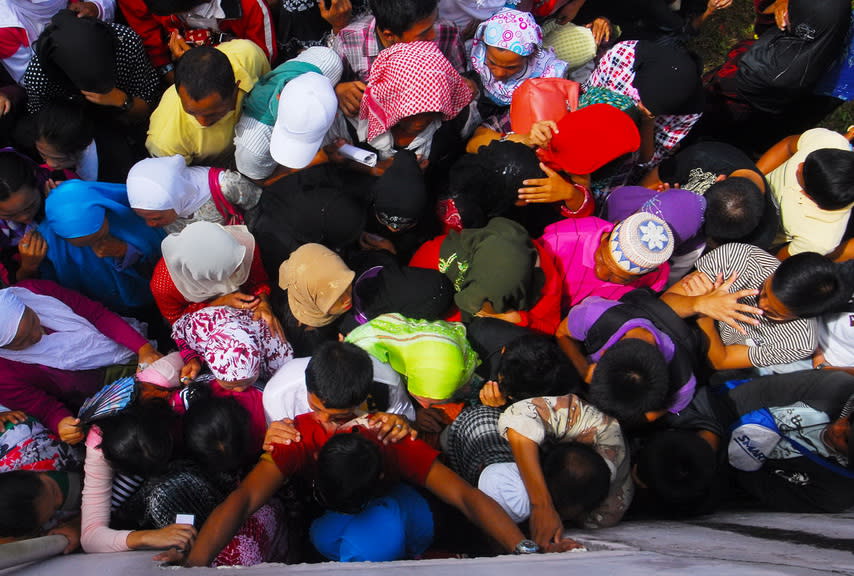The ghosts of ARMM registrations past are back

By Carolyn O. Arguillas, MindaNews and VERA Files
(First of two parts)
MAGUINDANAO — The girl in black abaya waiting outside a voting registration center at the Datu Pendililang Piang Elementary School in Datu Saudi Ampatuan town on Wednesday afternoon looked 13 or 14 but claimed to be 19.
"You're in college," we asked Baileng (not her real name). She shook her head. "High school?" She again shook her head.
"Grade Six," she replied, almost in a whisper.
"When did you start going to school?" The girl kept silent.
"When are you going to turn 20?," we asked. "Di ko alam" (I don't know), Baileng said.
The ghosts of registrations past are back in the five-province, two-city Autonomous Region in Muslim Mindanao (ARMM), threatening the bedrock of its reform agenda and the very reason why the voters' list in the region was annulled in the first place: girls and boys made to pretend they are 18 years old and above, hakot (hauling) of "flying" or multiple registrants in exchange for cash, and clustering of barangays that allegedly raises protests from rival politicians.
It wasn't just in this town that children lined up to register, each with an assumed age, always claiming to be above 18 or turning 18 before the May 13, 2013 elections.
Elsewhere in Maguindanao, the election monitoring group, Citizens Coalition for ARMM Electoral Reforms (C-CARE), reported "rampant registration of minors with their parents accompanying them, vouching for their age."
The commissioners of the Commission on Elections (Comelec), including chair Sixto Brillantes, admitted to reporters having seen young girls and boys waiting for their turn at the VRCs in the provinces they were assigned to.
Congress' Joint Resolution 3, passed by both Houses in May and approved by President Benigno Simeon Aquino on June 11, annulled the Book of Voters of the ARMM provinces of Basilan, Sulu, Tawi-tawi, Maguindanao and Lanao del Sur and the cities of Marawi and Lamitan, and directed the Comelec to immediately conduct a new general registration of voters in the region.
The Joint Resolution noted that data from the National Statistic Office (NSO) indicate bloated population figures in the ARMM "that would suggest that the voters' lists in the region were padded."
It said that while the population in the ARMM was 4.1 million in 2007, a revalidation by the NSO in 2010 revealed its population was "only a little more than 3.3 million." It also noted that while the country's population excluding ARMM, grew by just 1.89 percent between 2000 and 2007, ARMM reported a population growth rate of 5.46 percent, with Maguindanao at 6.6 percent and Basilan at 6.44 percent.
The Resolution also noted that the Comelec had admitted publicly the presence of "hundreds of thousands of illegal and fictitious registrants in the ARMM which need to be deleted from the Book of Voters."
It added that the anomaly in the ARMM, also repeatedly referred to as the country's "cheating capital" during elections, has national ramification because the so-called "ghosts" or
"fictitious and double (some are triple) registrants constitute the so-called 'command votes' or 'controlled votes' wielded by political warlords that could decide the winner not only in local but most importantly the national elections."
Comelec's website gave two figures on the number of voters in the ARMM: 1.88 million as of January 2010 and 1.77 million, according to a press release by the poll body's Education and Information Department on June 15.
ARMM's OIC Executive Secretary Anwar Malang said the first three days of registration in the region yielded some 300,000 registrants. He said they estimate 800,000 more will register as the estimated number of registered voters in the region under the revalidated population data would be around 1.1 million.
To help "exorcise" the ghosts of registrations past, the Comelec, Department of Interior and Local Governments, the ARMM, the military, police and election monitors — deployed their respective personnel and devised ways to help ensure a clean registration.
The Comelec passed a resolution suspending from June 25 to July 31 what was supposed to be a continuing registration in all non-ARMM areas nationwide, including the scheduled special voters' registration for Persons With Disabilities, to deploy personnel and machines to the ARMM.
Comelec personnel were deployed to the ARMM, bringing with them their own voters' registration machines (VRMs) or Data Capture Machines that would acquire the registrants' biometrics data through digital images of their photographs, fingerprints and signatures. Some of the personnel came and VRMs came from as faraway as Balangiga in Samar or Sta. Rita in Pampanga.
On the issue of "flying" registrants or those from other provinces outside the ARMM registering in the region or from other towns within ARMM, Comelec officials are optimistic that these "multiple registrants" will be done away with under the new registration.
Commissioner Christian Robert Lim, commissioner in charge of Maguindanao, said the Comelec "will delete" all the registrations of multiple registrants. "At the end of the day, di ka pwedeng magboto" (you won't be able to vote).
OIC ARMM Governor Mujiv Hataman acknowledged the problems but urged "everyone, civil society" and election monitors to file complaints before the local Election Registration Boards (ERBs), the next step in the registration process.
The last day for posting the notice of hearing with lists of applicants is on July 31 while the last day to file opposition to application for registration is on August 6. Hearing and approval or disapproval of application for registration is from August 13 to 17.
After the ERB hearings, when the data shall have been consolidated, they will be forwarded to Manila for matching with other registered voters nationwide, through the Automated Fingerprint Identification System or AFIS.
[Tomorrow: Exorcising the ghosts]
(ARMM WATCH is a project of VERA Files in partnership with MindaNews, The Asia Foundation and Australian Agency for International Development. VERA Files is put out by veteran journalists taking a deeper look at current issues. VERA is Latin for "true.")

